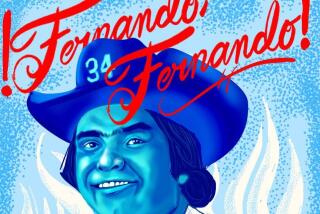Laughing with the music
- Share via
A mock biopic whose protagonist is struck “smell-blind” by a childhood machete mishap, “Walk Hard: The Dewey Cox Story” sends up the cliches of the rock ‘n’ roll movie with unfettered glee. But creating the musical repertoire for the film’s fictional rock legend was a surprisingly sober affair.
Some songs, like the Bob Dylan pastiche “Royal Jelly,” are outright jokes, but others serve as a straight-faced counterpoint to the on-screen absurdity. “Take My Hand” evokes the delicate melody and lyrical innocence of Buddy Holly, but when Dewey plays it at his high school talent show, it unleashes an orgiastic riot worthy of Jerry Lee Lewis.
“When we set out to make the music, we knew the songs had to be funny,” says “Walk Hard” star John C. Reilly. “But we quickly realized they had to be good too.”
Reilly spent four months recording Dewey Cox songs, some 40 in all (15 are available on the soundtrack CD, and 15 more on its digital version). As he notes, “That’s more than some people’s entire discography.”
By the time the process was complete, Reilly had the character well in hand, despite the fact that not a frame of film had been shot. “The music was a big part of preparing for the movie,” he says. “Every time we decided on a lyric he would sing, it was saying a lot about him.”
“John was living within it,” adds director and co-writer Jake Kasdan. “When you actually have the guy performing the part, and it is in a way a performance, it makes you start to make decisions about what the guy is like in a broader context than just what’s in the script. You have to answer a lot of questions.”
Dewey’s greatest hits were concocted by a stable of songwriters, working closely with Kasdan, Reilly and co-writer Judd Apatow. Soundtrack producer Michael Andrews oversaw the pitch-perfect evocation of period styles, from ‘50s rock through ‘60s psychedelia and Dewey’s ill-advised stab at disco.
Some songs, like the title track, were written into the script, complete with titles and lyric fragments. Others, like the double entendre-ridden “Let’s Duet,” were conceived in broader terms. And still others came out of brainstorming sessions.
“The songwriters really fed on our ideas,” Reilly says. “We’d give them a song title, and that would give them an area to work in. We’d throw in a couple of funny lines, and they would flesh them out.” Reilly shares writing credit on several songs, including the Everly Brothers-esque “Darling” and the juke-joint stomper “(Mama) You Got to Love Your Negro Man.”
Several songwriters produced versions of the title track, with Marshall Crenshaw’s twangy, hard-bitten version carrying the day. But Kasdan eventually narrowed the songwriting pool to the duo of Mike Viola and Dan Bern, who had a hand in more than half of the movie’s compositions.
For Viola and Bern, who spent months coming up with Dewey’s songs, the process verged on method songwriting. “As time went on, it became more and more like something you just internalized,” Bern says. “After months and months of doing this, there were points when I felt like I had merged with Dewey, and I wasn’t quite sure where one started and the other began.”
“Getting inside Dewey’s head was a full-time job,” Viola says. “We both can’t put it down. I don’t know what it is, but we’re a little possessed by it.”
Says Kasdan: “There’s this balance running through the whole thing. The songs are comedic, but they’re not joke songs. We had the notion that this guy was really good, and that kind of underlies everything. . . . These had to be really good songs in their own right and still serve the comedic purpose of the film.”
Striking that balance often meant lending a heartfelt performance to a ridiculous idea. “Let Me Hold You (Little Man)” is a rousing protest song in the gentleman-folk singer mode of the early 1960s, with a quavering vocal modeled on Don McLean. The lyrics, however, are substantially less inspiring, devoted as they are to Dewey’s enthusiastic but oblivious embrace of the fictional cause of midgets’ rights.
“Beautiful Ride,” which graces Dewey’s lifetime-award acceptance speech, started out as a spoof of climactic summing-up numbers. But the song bears a surprising emotional kick, despite its occasional vapidity. “By the end of it, that song almost became all of our anthem,” Reilly says. “That line, ‘Make a little music till the day that you die,’ that’s what all the musicians and the people involved really believe. We were sort of joking that one song could encapsulate a man’s life, but we stumbled into some truth along the way.”
Reilly, whose effort in “Walk Hard” was rewarded last week with a Golden Globe nomination, says he put more work into the part than anything he’s ever played. “It’s almost like I’ve been preparing my whole life to play this part, even though it’s kind of a crazy, silly movie, and I’m known as a more serious actor, I guess. Between the music, being able to improvise and have the comedy happening, and being able to really sink my teeth into the more dramatic parts of the story, I was literally dancing as fast as I could.”
More to Read
Only good movies
Get the Indie Focus newsletter, Mark Olsen's weekly guide to the world of cinema.
You may occasionally receive promotional content from the Los Angeles Times.









